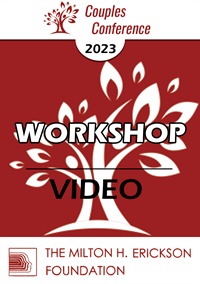CC23 Workshop 09 - Sexual Betrayal: An Intensive EMDR Approach for Couples - Cristine Toel, LPC
- Average Rating:
- Not yet rated
- Topic Areas:
- Workshops
- Categories:
- Couples Conference | Couples Conference 2023
- Faculty:
- Cristine Toel, LPC
- Course Levels:
- Master Degree or Higher in Health-Related Field
- Duration:
- 2:00:29
- Format:
- Audio and Video
- Original Program Date:
- May 06, 2023
- License:
- Never Expires.
Description
This workshop will provide participants with an understanding of how the Adaptive Information Processing Model (including the three-pronged protocol and 8 phases of EMDR) is applied for the treatment of relational trauma for the betrayer and the betrayed partner within the context of an intensive therapy model, provided by a therapeutic team system at Psychological Counseling Services, Ltd. (PCS). This presentation will focus on the implementation of EMDR that is focused on assisting the healing of the couple using Standard Protocol EMDR, EMDR addiction protocols, internal family systems EMDR, and couple’s shared EMDR.
Learning Objectives:
- Replicate the model in their own private practice.
- Understand typical patterns in terms of perspective and mindset of betrayers, some of whom suffer from compulsive, problematic sexual behavior, and their betrayed partners who are often suffering from post-traumatic stress and relational trauma.
- Utilize and seek further training in specific addiction EMDR protocols used for the betrayer.
- Gain insight and utilize common cognitive interweaves that allow for strength building and deeper EMDR processing that can involve healing historical, related trauma.
- Explore Case Studies that provide insight on how Couple’s EMDR can be used in a therapeutic practice to heal relational trauma, build trust and repair, and create a space for deeper connectiveness and intimacy.
Credits
Faculty

Cristine Toel, LPC Related Seminars and Products
Cristine Toel is a Licensed Professional Counselor at Psychological Counseling Services, Ltd. She is an EMDRIA Certified EMDR therapist, and an EMDRIA Approved Consultant. She is also a member of the ongoing Psychodrama Group at the Arizona Psychodrama Institute, and a specialist in Problematic Sexual Behavior (SASH). She works with adults, adolescents, couples, and families and specializes in cases of complex trauma, PTSD, anxiety, depression, problematic sexual behavior, betrayal, crisis and difficult life transitions, adult children of alcoholics (and other family of origin dysfunction), and cases involving divorce, remarriage, and blended family concerns.
PCS offers a weekly intensive program (30 hours of individual therapy and 25 hours of group therapy), which provides a therapeutic team approach for clients looking to mend difficult trauma, crisis, and addiction. Cristine finds it fulfilling to work with intensive clients, because it allows her to pursue and help heal deep, historic traumas that are sometimes challenging to address in weekly therapy.
Cristine has a nurturing, down-to-earth approach, and she is passionate about healing trauma, recognizing strengths, and developing an “I-Can” approach to living. She encourages her clients to trust their ability to handle struggles in life, including conflict, stress, anxiety, depression, boredom, and overall messiness, by adopting healthy coping rather than maladaptive habits, addictions, and escapes. As a result, she has seen many clients experience significant shifts and begin to engage in deeper intimate relationships with the people who love them.


